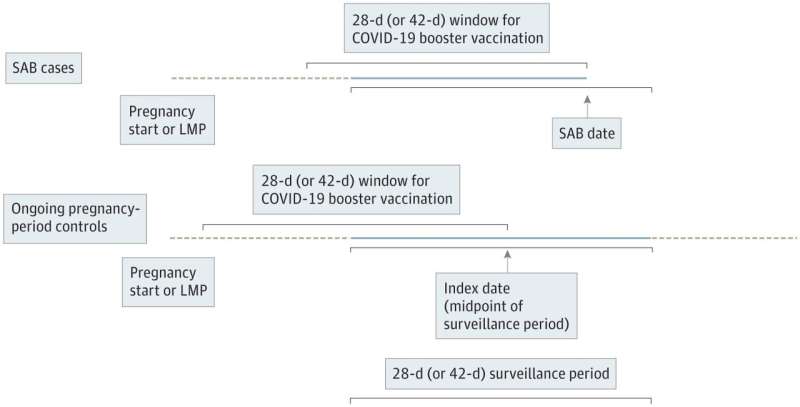This article has been reviewed according to Science X's editorial process and policies. Editors have highlighted the following attributes while ensuring the content's credibility:
fact-checked
peer-reviewed publication
proofread
New research finds COVID-19 mRNA booster vaccinations in early pregnancy did not increase miscarriage risk

HealthPartners Institute researchers have published new data in JAMA Network Open that show monovalent COVID-19 booster vaccinations administered in early pregnancy (before 20 weeks' gestation) were not associated with miscarriage. The research adds to the growing understanding about the safety of COVID-19 booster vaccinations among people who are pregnant.
The researchers analyzed data from more than 100,000 pregnancies between six and 19 weeks' gestation from eight large health systems participating in the Vaccine Safety Datalink (VSD). The data was collected between Nov. 1, 2021, and June 12, 2022. Researchers found, using a 28- or 42-day window, that receipt of a booster vaccination was not associated with miscarriage.
"COVID infection during pregnancy increases risk of poor outcomes, yet many people who are pregnant or thinking about getting pregnant are hesitant to get a booster dose because of questions about safety. Our data supports the safety of booster vaccination in early pregnancy," said Elyse Kharbanda, MD, MPH, senior investigator at HealthPartners Institute and lead author of the study.
More safety data to support COVID-19 vaccination
Separate research recently published in Obstetrics & Gynecology—also led by HealthPartners Institute—showed that COVID-19 booster vaccination at any point during pregnancy was not associated with increased risk for serious acute adverse events.
In that study, researchers evaluated data from more than 80,000 pregnancies that occurred between September 23, 2021 and June 30, 2022. Booster vaccination in pregnancy did not increase risks for thrombocytopenia, myocarditis, venous thromboembolism, ischemic stroke, or other serious adverse events within 21 or 42 days after vaccination.
"We continue to find that COVID-19 vaccinations in pregnancy are safe," said Malini DeSilva, MD, MPH, investigator at HealthPartners Institute and lead author of the study. "Ongoing vaccine surveillance work is important because it provides reassurance and helps people feel confident in their vaccinations."
Data for both studies came from HealthPartners and seven other large health systems that make up the Vaccine Safety Datalink (VSD). VSD is a research network that conducts post-marketing surveillance of vaccines licensed and used in the United States. Both studies evaluated safety of the monovalent COVID-19 vaccine booster. Future studies will evaluate safety of the bivalent booster.
More information: Elyse O. Kharbanda et al, COVID-19 Booster Vaccination in Early Pregnancy and Surveillance for Spontaneous Abortion, JAMA Network Open (2023). DOI: 10.1001/jamanetworkopen.2023.14350 jamanetwork.com/journals/jaman … /fullarticle/2805029
Malini B. DeSilva et al, Medically Attended Acute Adverse Events in Pregnant People After Coronavirus Disease 2019 (COVID-19) Booster Vaccination, Obstetrics & Gynecology (2023). DOI: 10.1097/AOG.0000000000005241




















